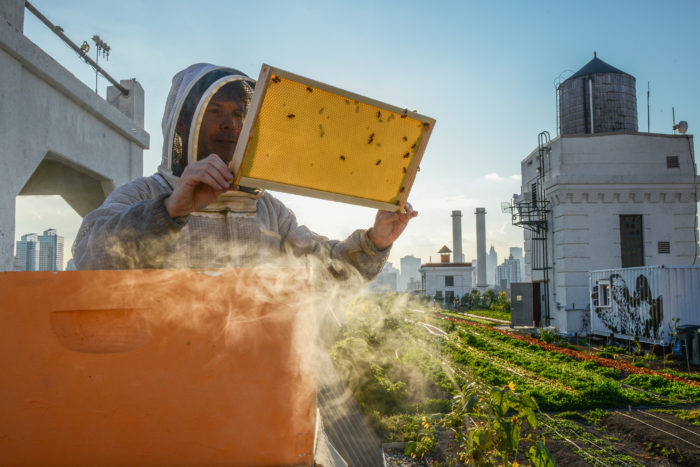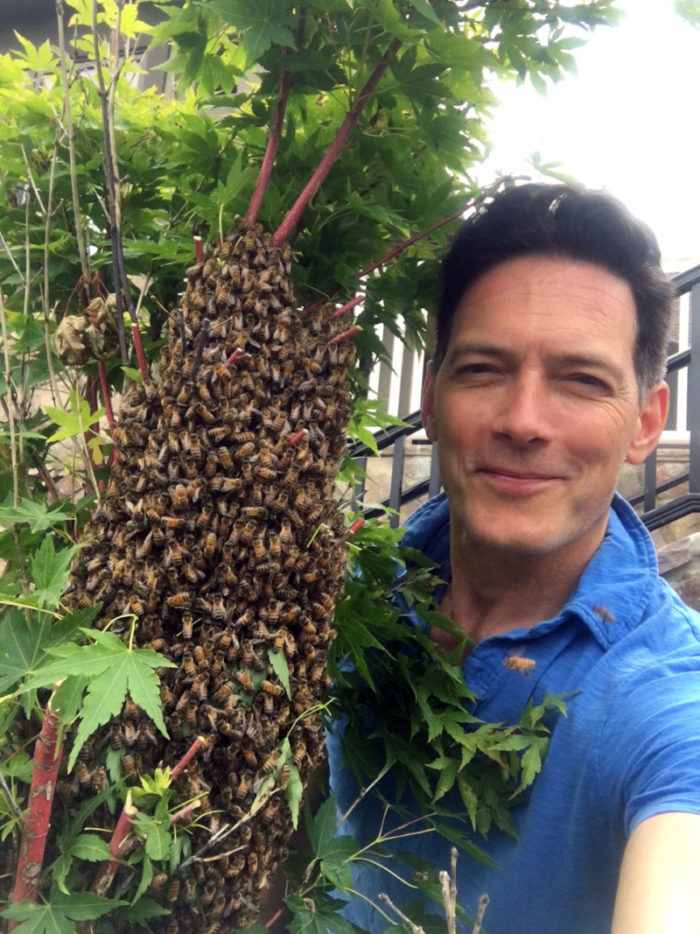What do honeybees have in common with cheetahs, tarantulas and walruses? Until 2010, they were all “wild animals” in the view of the city’s Department of Health, which meant keeping bees was illegal in the city. A few rogue apiarists operated under the radar, but when the ban was lifted seven years ago, beekeeping went legal just in time to create a hive-to-table movement of locally made honey.
For most Brooklyn apiarists, beekeeping is a hobby with benefits, providing honey to sell at farmer’s markets and to give away for special occasions, but hives have also been installed by businesses ranging from the Brooklyn Grange rooftop farms to the borough’s downtown Marriott hotel. Currently, the city has 91 registered beekeepers maintaining 285 hives, more than 100 of them in Brooklyn and a similar number in Queens.
Mimi Chan, a web designer who lives in Fort Greene, took up beekeeping after losing her backyard garden (along with the house) in a divorce. Her cousin gave her the idea, pointing out an upcoming class in beekeeping. “She thought it would help me get over losing my garden. I enrolled in the class and fell in love with beekeeping,” Chan recalls. “That was 5 years ago, and I’ve been beekeeping ever since.” She now keeps two beehives in her backyard, chronicling their activity on Instagram.

Apiarist Chase Emmons handles a new honeybee frame at Brooklyn Grange Rooftop Farm (Photo by Esther Horvat/Redux)
One might suspect that bees, normally associated with orchards and fields, would find it rough in the big city. But the opposite is true. Urban bees enjoy a good quality of life for several reasons. One is job stability; their hives aren’t moved around from crop to crop like those used in commercial agriculture. Another is the city’s smorgasbord of flower gardens and street trees. But probably the biggest benefit is the relative lack of agricultural pesticides. Most city gardeners go easy on bug spray, with some exceptions. “I’ve had seasons when the whole hive has died because of neighbors using pesticide,” said Chan. “It’s a very difficult thing to watch.” Pesticides have been among the factors blamed for Colony Collapse Disorder, a loss of bees plaguing the agricultural industry.
Other surprises from the urban apiaries:
The bees do most of the work: “The barrier of entry is rather low: no need for a lot of space. Like with chickens, no need for constant attention,” says Chase Emmons, the master beekeeper at Brooklyn Grange, which has rooftop crop gardens in the Brooklyn Navy Yard and Long Island City. Emmons says that managing bees can be less labor intensive than, say, having a cat. “With cats, you want to feed them daily, change their litter. Bees do most of it themselves.” And bees are productive; Brooklyn Grange has about 30 hives that produce hundreds of pounds of honey annually, which the company sells at its weekly farm stands.
Yet beekeeping requires know-how: After beekeeping became legal in the city, a lot of early adopters rushed into the field, only to realize that keeping bees healthy calls for a mixture of expertise and instinct. “It’s always frustrating when you do everything right but the bees still get sick,” or fail to expand their honeycombs, says Tim O’Neal, a middle-school biology teacher who keeps hives in Red Hook. “Sometimes you have to listen to them and go with your gut, and be a creative problem solver.”
The flavor of urban honey varies by season: Springtime honey draws much of its smooth sweetness and cool aftertaste from nectar-bearing “boulevard trees” including lindens. Other plants–maple trees, ivies and clover–provide their own distinctive flavors. Autumn honey, by contrast, is darker, thicker and and maltier, deriving those qualities from thistle-like knapweed and other species that grow in vacant lots and random spots in the urban landscape.

Mickey Hegedus raises bees but also offers a swarm-removal service (Photo courtesy of Mickey Hegedus)
Climate change is affecting the bee population: Most urban bees are gentle sorts of the apis mellifera variety, like the docile Italian honeybee as well as the Carniolan bee (a hardy sort) and the Russian bee (very productive but also restless). Mickey Hegedus, a third-generation beekeeper in Clinton Hill who specializes in extracting rogue hives for a fee, recently removed a hive in New Jersey that had Africanized traits. Known colloquially as “killer bees,” the crossbreeds of European and African bees have been working their way north because of global warming.
“Africanized traits don’t survive in colder climates because they’re transient bees, and the bees that survive the north have to store a lot of honey to survive,” he explained. “We’re gonna see a lot of the Africanized traits learning to survive. That’s just something we’re gonna have to deal with.” Africanized bees can be used for honey production but are more difficult to manage because of their aggressive defense of their hives. Weird weather can also influence honey production; this year, an early heat wave in February and frost in March froze many fruit-tree blossoms, thus lowering the yield.
Local honey may be good for your health: Not only is honey a natural sweetener that won’t rot or ferment, but it has reputed medicinal purposes that have earned it a spot on the shelves of some Brooklyn drugstores. That’s because many people believe that local honey can reduce seasonal allergy symptoms in a way similar to immunology: little doses of the pollen that’s bothering you work as a kind of inoculation. Scientific research has tended to debunk that idea, and in fact some medical professionals have said unprocessed honey could be harmful. Other authorities have argued that honey has many natural ingredients that could be curative. “A blend of sugar, trace enzymes, minerals, amino acids, and vitamins, honey is antibiotic, antiseptic, antifungal, and packed with polyphenols and infection-fighting antioxidants, all of which deliver significant health benefits,” reported Rodale’s Organic Life in June.
Maintaining hives can be a nice little business: Nick Hoefly and his wife Ashley started keeping bees a few years ago as a hobby. “It’s something we really enjoyed and always had people, even strangers, asking for some honey,” said Hoefly. “It seemed like an opportunity to make a living off something we already liked doing.” They launched Queens-based Astor Apiaries, which offers hive-maintenance services and a honey-subscription service called My Honey Crate. They work with small beekeepers and apiaries around the country to source new varieties of honey each month.
Beekeepers are glad to teach you what they know: If you want to try your hand, you’ll need to spend several hundred dollars to buy a nucleus colony (generally online), protective gear to keep from getting stung (too much), smoke-producing gear (to calm the bees), and the hives themselves. And you’ll need to educate yourself. “As a rule, beekeeping is not something you want to learn on YouTube,” says Emmons. Several beekeepers offer classes at Brooklyn Grange and Brooklyn Botanic Garden. Biology teacher O’Neal started Borough Bees, a resource for beekeepers and aspiring ones. “I figured that, just by sharing and my experience that I had and the mistakes I had made in the last 20 years, that I could save some other people a bit of trouble.”
Stacey Vazquez and Carolina Zuniga-Aisa, who work in the restaurant and fashion industries, respectively, met two years ago when they were paired up in the beekeeper-certification program at Brooklyn Grange. Together they founded Island Bee Project to provide education and offer bee-supervision service for people who want to keep hives on their rooftops or backyards. The bee-project partners keep hives in such places as the grounds of the Wyckoff House Museum in Canarsie as well as on Governor’s Island. “There’s a lot of quick thinking and improvisation involved,” says Vazquez. “You really have to problem-solve as you go, because you never know what those little bees are up to when you’re gone!”